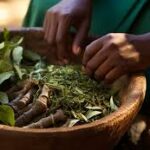Traditional Medicine in Africa: Bridging Past and Present

For centuries, traditional medicine has been the backbone of healthcare in Africa. Long before modern hospitals and pharmacies, communities relied on herbal remedies, spiritual practices, and indigenous knowledge to treat illness and maintain wellbeing. Even today, the World Health Organization (WHO) estimates that over 80% of Africans use traditional medicine as part of their primary healthcare.
But in an era of rapid modernization and globalization, how does traditional medicine fit into Africa’s evolving health systems? This article explores the cultural importance, health benefits, challenges, and future role of traditional medicine in Africa.
The Cultural Roots of Traditional Medicine
Traditional medicine in Africa is deeply woven into culture, spirituality, and community life. Healing practices often combine:
-
Herbal medicine – plants, roots, and leaves used to treat various conditions.
-
Spiritual healing – rituals, prayers, and ancestral guidance.
-
Massage and bone-setting – physical therapies for injuries and pain relief.
-
Preventive care – herbs and dietary practices to maintain balance and vitality.
For many Africans, health is seen not only as the absence of disease but also as harmony between the body, mind, spirit, and environment.
Why Traditional Medicine Remains Relevant
1. Accessibility and Affordability
Modern healthcare is expensive and often concentrated in urban centers. Traditional healers are widely available in rural areas and provide affordable care.
2. Trust and Cultural Connection
People often trust traditional healers because they share the same cultural values, speak local languages, and understand community traditions.
3. Holistic Approach
Unlike some modern treatments, traditional medicine often addresses physical, emotional, and spiritual health, offering patients a more comprehensive form of care.
4. Rich Botanical Knowledge
Africa is home to thousands of medicinal plants. Remedies using moringa, neem, aloe vera, and African ginger have proven therapeutic benefits.
Challenges Facing Traditional Medicine
-
Lack of Standardization – Dosages and preparation methods vary widely, raising safety concerns.
-
Limited Scientific Validation – Many remedies lack rigorous clinical studies to prove effectiveness.
-
Risk of Exploitation – Unscrupulous practitioners may take advantage of vulnerable patients.
-
Integration Issues – Tensions often exist between traditional healers and formal healthcare systems.
Towards Integration: Bridging the Gap
Several African countries are working to integrate traditional medicine into modern healthcare systems. For example:
-
South Africa has recognized traditional healers as part of its healthcare workforce.
-
Ghana established herbal medicine units in public hospitals.
-
Nigeria created a traditional medicine department under its Ministry of Health.
Such efforts aim to combine the strengths of both systems, ensuring safety, accessibility, and cultural relevance.
The Future of Traditional Medicine in Africa
The future lies in collaboration—between traditional healers, modern doctors, researchers, and policymakers. Key steps include:
-
Research and Documentation – Conducting scientific studies on herbal remedies to validate effectiveness.
-
Training and Regulation – Setting safety standards and professional guidelines for traditional practitioners.
-
Local Manufacturing – Developing African-owned pharmaceutical industries based on indigenous plants.
-
Education – Teaching younger generations the value of African medicinal knowledge while adapting it to modern needs.
Conclusion
Traditional medicine in Africa is not a relic of the past—it is a living, evolving practice that continues to shape health and wellness today. By bridging past and present, Africa can create a healthcare model that is uniquely its own—rooted in culture, enriched by modern science, and capable of serving its diverse populations.
Written by Fawzi Rufai, Medically Reviewed by Sesan Kareem



